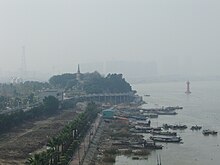Jinjiang, Quanzhou
Jinjiang
晋江 | |
|---|---|
| 晋江市 | |
 Jinjiang's Lüzhou (Green Island) Park, with a monument bearing inscription "诚信、谦恭、团结、拼搏" (Integrity, humility, unity, hard work) | |
| Country | People's Republic of China |
| Province | Fujian |
| Prefecture-level city | Quanzhou |
| city seat | Luoshan Subdistrict (罗山街道) |
| Area | |
| • Total | 721.7 km2 (278.6 sq mi) |
| Population | |
| • Total | 1,024,331 |
| • Density | 1,400/km2 (3,700/sq mi) |
| Time zone | UTC+8 (China Standard) |
| Postal code | 362200 |
| Area code | 0595 |
| Website | http://www.jinjiang.gov.cn/ |
Jinjiang City (simplified Chinese: 晋江; traditional Chinese: 晉江; pinyin: Jìnjiāng; Pe̍h-ōe-jī: Chìn-kang) is a county-level city of Quanzhou City, Fujian, People's Republic of China. It is located in the southeastern part of the province, on the right or south bank of the Jin River, across from Quanzhou's urban district of Fengze. Jinjiang also borders the Taiwan Strait of the East China Sea to the south, and Quanzhou's other county-cities of Shishi and Nan'an to the east and west, respectively. It has an area of 721.7 square kilometres (278.6 sq mi) and a population of 1,024,331 as of 2003.[1]
Administrative divisions

Jinjiang has 6 subdistricts and 13 towns:
- Subdistricts

- Towns
- Anhai (安海镇)
- Chendai (陈埭镇)
- Chidian (池店镇)
- Cizao (磁灶镇)
- Dongshi (东石镇)
- Jinjing (金井镇)
- Longhu (龙湖镇)
- Neikeng (内坑镇)
- Shenhu (深沪镇)
- Xibin (西滨镇)
- Yinglin (英林镇)
- Yonghe (永和镇)
- Zimao (紫帽镇)
Demographics

Jinjiang is known for the large number of foreign-invested factories which operate there, especially in the clothing and name-brand footwear industry. Many migrant laborers come from elsewhere in Fujian and even from outside the province to commit themselves to year-long contracts.
Jinjiang people speak the Quanzhou variant of Minnan dialect which is largely intelligible to speakers of the Xiamen/Zhangzhou variant (which is also spoken by most Taiwanese). As in many parts of China, most Jinjiang people can use Putonghua (Mandarin) to communicate with non-local people in commercial and other daily interactions.
Transportation

Jinjiang is the site of the Quanzhou Jinjiang Airport, a gift from Lai Changxing (see below). The facility is of international standard but is kept domestic because the province has been allotted only two international airports, one in the capital Fuzhou and one in nearby Xiamen.
Jinjiang Station of the new high-speed Fuzhou-Xiamen Railway is located 14 kilometres (8.7 mi) away from the center of the city.
Jinjiang in the News
Jinjiang's most infamous son is undoubtedly Lai Changxing who has been described by the official Xinhua news agency as "China's most wanted fugitive". Lai was a major player in the Xiamen-centred Yuanhua corruption and smuggling scandal which broke in 1999. Tipped off by China's central police leadership, Lai fled to Canada on fake Hong Kong SAR documents with his wife Zeng (often Tsang) Mingna and their children. He was eventually detained on Canadian immigration charges and put under house arrest at his home in Burnaby, British Columbia.
See also
- José Rizal, hero-martyr of the Philippine Revolution and National Hero of The Philippines whose grandfather is a descendant of Jinjiang.
References
- ^ "Profile of Jinjiang" (in Chinese). Retrieved 2008-10-16.
- ^ "MANICHEISM i. GENERAL SURVEY" at Encyclopædia Iranica
- ^ "CHINESE TURKESTAN: vii. Manicheism in Chinese Turkestan and China" at Encyclopædia Iranica
